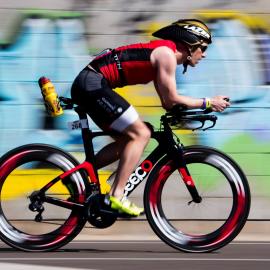Triathlon racing may be in off-season hibernation, but you are not. So give yourself a breather straight after your last race and then click into autumn gear to begin laying the foundations for a new season.
This might be deciding whether you’re looking to race faster or longer, attempt your first Olympic-distance or splash out on your first tri bike.
Just remember that autumn into winter can present a more taxing time for triathletes. The chances of picking up a cold increase by 80% during the off-season, so you’ll inevitably miss more sessions than you might have done in the summer.
Don’t be harsh on yourself. These things happen. Return to good health and move on. But you can also prepare your defences.
For the sake of being ready when racing does return next year, it’s time to start thinking about your off-season plan. These dark, damp months are prime time for building your base fitness, the foundations upon which next year’s successes will inevitably be based.
But before you throw yourself head first into this vital phase of training, it’s worth taking some time to refresh and retune your body. Borrowing expert advice from those in the know, we’ve pulled together 15 tips that will help you do exactly that.
How to have a post-season refresh
1. Take a break
Don’t be scared to take a complete break from the sport. I advise most of my athletes to take two or three weeks off at this time of year. Not only does this facilitate a much-needed physical recovery following race season, but it also provides a vital mental break.
Spend quality time with family and friends or head off on holiday. I know (from experience) that you’ll want to stay relatively active, so why not try something a little less strenuous such as hiking or paddle boarding – anything but swimming, cycling or running! James Pryke
2. Plan for 2022
Once the dust has settled and you’ve had time to digest how your season went, you may want to start gently thinking about the following season. How will your training be structured? How will you periodise your training cycles? And what races would you like to focus on?
It’s a good idea to start to pen these thoughts for the forthcoming season during your time off as it’ll help to softly maintain motivation. This means that when the time comes to restart training, you’ll have a clear direction on where you’ll be heading. Nick Beer
3. Dive into the detail
Evaluate your targets for the coming season. Analyse each of the races you completed this year. What went well? What didn’t go well? Did you swim too far because your sighting was off?
Did you lose time in transition because you couldn’t remove your wetsuit quickly? Did you struggle to fuel properly while on the bike and run? If yes, practice makes perfect, so work on this over winter and you’ll go a long way to hitting your targets next year. James Pryke
4. Analyse your technique
Take a look at yourself and your performance this year and consider any weaknesses you may have. And be brutally honest! Think about improving your technique through a professional swim and/or run analysis.
No matter how good a triathlete you are, there’s always room for improvement and addressing any issues with technique will help prevent future injury and could result in you achieving a personal best next year. James Pryke
5. Head off-road
Treat yourself to a pair of trail running shoes or a mountain or gravel bike and give yourself something to look forward to after you’ve completed your refresh. Many people lose their motivation in the autumn and winter months, so one solution is to mix things up a bit.
If you usually run on the road, head off-road once a week instead. The same applies for cycling. Hit the trails, there are plenty around, and experience the thrill of mountain or gravel biking, where you don’t have to worry about cars or traffic lights. Have some fun! James Pryke
6. Check your nutrition
An end-of-season break provides a good opportunity to work with a sports dietitian, to ensure that once training commences your workload can be matched with adequate fuelling. This can not only help reduce injury, but also optimise performance.
And, as there’s no racing for a few months, it’s the perfect time to experiment so you can get things right without having any mishaps on race day. So, seek some advice, do some trial and error, and lay the foundations for a successful 2022. Brad Beer
7. Address any niggles
This is the perfect time to address any lingering or accrued injury concerns that may have developed through the season by seeking professional help.
Doing so will reduce the risk of rebound injuries when you return to your normal training workload and ultimately serve to allow for greater workloads being absorbed through the season.
It may be frustrating to take time out to do this, but it’s better to do so now rather than just before or during the race season. Brad Beer
8. Try something different
The off-season is an opportunity to try something completely different, like weekend hiking holidays, trying out new sports and activities or something completely opposite to what you’re used to doing.
It’s a chance to finally have fun with other sporting or non-sporting endeavours that may have been inconvenient or not practical to do during the season. So now, on your break, you can fully immerse yourself in other pursuits without the added stresses of training and racing. Nick Beer
9. Invest in S&C
Now is the ideal time to continue (or even begin) some strength and conditioning (S&C) activities. S&C is the fourth discipline in our sport, and it’s all too often overlooked because we simply don’t have the time or energy.
Change that for good by implementing an S&C plan that focuses on improving your core stability/movement efficiency. You’ll reap the benefits come race season. James Pryke
10. Prepare for winter
The winter months can be challenging: from navigating through the short daylight weeks in order to maintain training consistency to grinding through the winter weather each day as you strive towards achieving your goals.
You want to make this journey as effortless as possible. To do this, it’s a good idea to get your training kit and equipment winter ready. Add mudguards to your bike, invest in thermals, purchase or clean and reproof waterproof kit, and make sure you have a set of cleaning products for your bike.
This will all help make the coming months flow more smoothly and, more importantly, ensure both you and your kit can maintain performance levels. Nick Beer
11. Audit your kit
As triathletes, it’s all too easy to accumulate a lot of training kit and equipment, especially during race season. Some of it you may reuse, other bits you may not use again. So, towards the end of your break, think about giving your kit and equipment a seasonal ‘spring clean’.
Pick out what you need for your winter training, put into storage the things you don’t and give away/sell any pieces of kit that you may not use again. This’ll help you de-clutter and focus on what you need for winter training. Nick Beer
12. Focus on drills and technique for each sport
You have more time on your hands now you’re taking a break and having a refresh, but it’s not uncommon to feel agitated to get started again. This is a normal feeling to have as you’ve been regimented in your training for the past 11 months.
A great way to extinguish this urge is to focus on drills and technique. Introducing these sessions will help bridge the gap between complete rest and full training. Use this time to focus on elements of each sport that typically get neglected once training is in full swing. Nick Beer
- Two swimming drills that improve every skill
- Four bike drills to improve your triathlon times
- Running: 5 drills that will improve your run technique
13. Enjoy different foods
When we’re in the depths of training and/or in the middle of the season, nutrition and the type of food we eat become very important. As triathletes, we can use nutrition for performance benefits, staying healthy and to help manage our race weight.
Maintaining a strict routine usually means you have to be selective with what you eat and be strong at saying no when temptation presents itself. But now you’re taking a break from racing you have a chance to loosen this grip. So, take this opportunity to enjoy the foods you have to reluctantly decline during the season. Nick Beer
14. Sleep in
When that early-morning alarm rings to get up and go training, that initial feeling of dread typically vanishes as you slowly sip your coffee and start to prepare for the training session.
Now the season is over and you’ve slowed down you can, without any guilt, treat yourself to some lazy mornings!
Use this time to enjoy the opportunity to sleep in without having to rush out the door to train. The extra sleep will help your body recover and heal, allowing you to mentally recharge and feel refreshed. Nick Beer
15. Recharge your social life
During the triathlon season, it’s not uncommon to make sacrifices to prioritise your training and races. We’ve all been in a typical predicament where we get invited to a social engagement, but it happens to fall on race day.
As triathletes, we give up a lot in order to achieve our goals. But now you’re out of season you have an opportunity to catch up on the things you’ve missed: seeing friends, attending events and doing things you had to say no to during the season. Nick Beer
Top image credit: Getty Images


